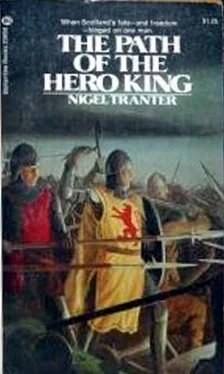The English flanking party, on meeting the refugees of the main body fleeing across the ford, had evidently decided that only fools threw good money after bad. They had not even waited to oppose the Scots themselves taking the ford, as they might have done successfully, but set off southwards, down the west side of the loch, at speed, still a disciplined if un blooded force amongst their broken and unhappy compatriots. Campbell had a picket trailing them -but he reckoned that they had seen the last of that squadron of wise men.
The King drew a long quivering breath.
So the day is ours, Neil-all ours! I thank God-and you all-for it. We needed it, I faith! But … that is today. Tomorrow-what of tomorrow?
Pembroke is not yet committed, did not come himself. And he has a mighty force. Tomorrow they will be aswarm in these valleys like a wasps nest disturbed.
Enough for today that we have won this battle, at least, the other grunted.
It was no battle-only a skirmish. But we shall call it a battle, yes. Make much of it-for our own purposes. So long as we do not deceive ourselves. The battle of Glen Trool, no less-the first battle we Scots have won against the English in the field since Stirling Brig! So let the word go out, that men may take heart. All over the land.
But we know better, Neil … The King reined round.
Now-to work. I want to be far from here before nightfall.
Chapter Nine
It was well over a year, not indeed since his coronation, that the King had sat at ease, or at all, under a roof of his own. That he should be able to do so now, even though the roof was a small and unimportant one, was perhaps a sign, an encouragement, however modest. That it should be back within a few miles of the point where he had made his February landing on the Carrick shore of the mainland, nearly three months before, could be another satisfaction-although it could also be the reverse, depending on which way the thing was viewed. Progress, or the lack of it. At any rate, Bruce did stretch before a hearth that he could call his own, that early May evening, and was moderately thankful-that is, for so long as he carefully kept his mind on the immediate situation and did not contemplate the appalling dimensions of the task before him.
Tired, after a long day in the saddle, he sat in the little hall of the Tower of Kilkerran, house of one of his Celtic vassals, Fergus son of Fergus, amongst the green foothills of the pleasant Water of Girvan, four miles south of Maybole, capital of his own Carrick, and only eight miles inland from Tumberry. Turnberry Castle itself was still held against him, and must remain so for the foreseeable future; he had neither the siege equipment nor the time for reducing powerful fortresses. But it was only the great castles which were held against him in Ayrshire now. Elsewhere he and his could ride at large, a month after Glen Trool.
Pembroke had been unexpectedly inactive since that affair. Not to be wondered at, perhaps, if it was true, as rumoured, that he had been summoned once more peremptorily to Lanercost in Cumberland to give an account of himself before the angry Edward Plantagenet. Bruce admittedly would not have enjoyed being in de Valences shoes, in that respect; but by the same token, it could be assumed that it would not be long before he was back again, greatly reinforced and spurred on to mighty endeavours against the hated Scots-he or another.
But meantime the Kings cause could be said to prosper, even though not spectacularly. With the main English army still at the Cree, holding that vital hinge between the Borders and Galloway, Bruce had moved north into Ayrshire. Daily men came to join him from Carrick, Kyle and Cunninghame, not in their thousands admittedly, not great lords and barons, but lesser men-a few knights, many lairds, and common folk. More important, perhaps, even than those who actually joined him, was the climate of opinion, the acceptance, at least in these parts, that the royal cause was no longer hopeless and to be shunned at all costs. Turnberry, Loch Doon, and Glen Trool had had their effect. Scots in more than Ayrshire held their heads a little higher.
None knew better than Robert Bruce, of course, how small-scale and ephemeral was such success. But at least it was a change from failure, from disaster and near despair. Even though that very day he had heard that Sir Philip Moubray, one of the Comyn faction -the same who had unhorsed him and nearly captured him at Methven eleven months before was heading south from Stirling with 1,000 men, to try to drive him back into the arms of the English on the Cree. Bruces commanders were summoned here to Kilkerran for a council on this, tomorrow, when his scouts should have reports for him.
It was not one of the commanders however who presently was announced as seeking audience with the King, but a very different sort of visitor.
Master Nicholas Balmyle, Official of St. Andrews, craves word with Your Grace, Gilbert Hay informed, at the door.
Will you see him?
Balmyle? Bruce sat up.
By the Rude-yes, I will see Master Nicholas!
The man who was ushered in was small, neat, compact, richly dressed in clerical garb, self-possessed and still-faced. He bowed slightly, but made no move to hurry forward to kiss the royal hand.
Bruce eyed him keenly, as well he might. Here, reputedly, was one of the cleverest men in Scotland, and one not hitherto notable for wearing his heart on his sleeve. He had indeed been Chancellor of Scotland for two years, under de Soulis Guardianship-which made him the last Chancellor, or chief minister, the realm had had, before all Scots government was swept away. The two pairs of eyes met and held-Bruces sterner than he knew, the clerics level, emotionless but shrewd.
Here is surprise, Master Nicholas, the King said carefully.
It has not been my pleasure to see you, for long. Even at my coronation!
The former Chancellor, Official of St. Andrews and Canon of Dunblane, had been one of the many notable absentees from that ceremony.
That was an occasion for the great, Highness, the other returned composedly.
Not for lowly servants of Holy Church, such as myself.
Lowly? the King joked.
You?
Aye, Sire. Younger son of a small life laird. A mere canon, an official in holy orders. And my good father-in-Gods humble messenger and steward.
Ha! Bruces somewhat suspicious glance widened.
You mean…?
That I have brought Your Grace a letter from my master.
From the Lord Bishop of St. Andrews, Primate of this realm.
From William Lamberton! From my friend! That was eager.
Yes. Balmyle drew out from within his dark cloak an unaddressed folded paper, battered and crushed but still sealed closely.
This reached me only days ago. By devious means. Within another, instructing me to convey it to Your Grace forthwith. And in person.
From England? Bruce took the letter.
A friar in the train of Bishop Beck of Durham brought it Secretly. My lord Bishop is held at Barnard Castle, on the Tees.
Opening the seals, the King strode to the window, to read. But he turned, and gestured to the table.
Meats. Drink, Master Nicholas
The folded paper contained another within it, this addressed to the High and Mighty Prince, Robert King of Scots, wherever he might be found. This opened, read:
My liege lord and good dear friend.
I have learned that there is occasion that this writing may be conveyed to Scotland in secrecy. I hasten to advantage myself, and pray God that it may in due course reach Your Grace.
My hope is that it finds you in good health. I think that this must be so for the word reaches this Durham, where I am held, of the works of no ailing man, of shrewd blows struck against the invader and those of your own subjects who betray their king. That you may prosper in these efforts is my constant prayer. And that I, held close here, may not aid you in your struggle is my as constant sorrow.
Читать дальше












